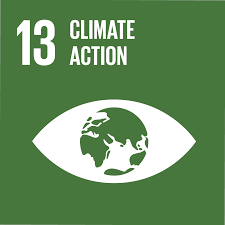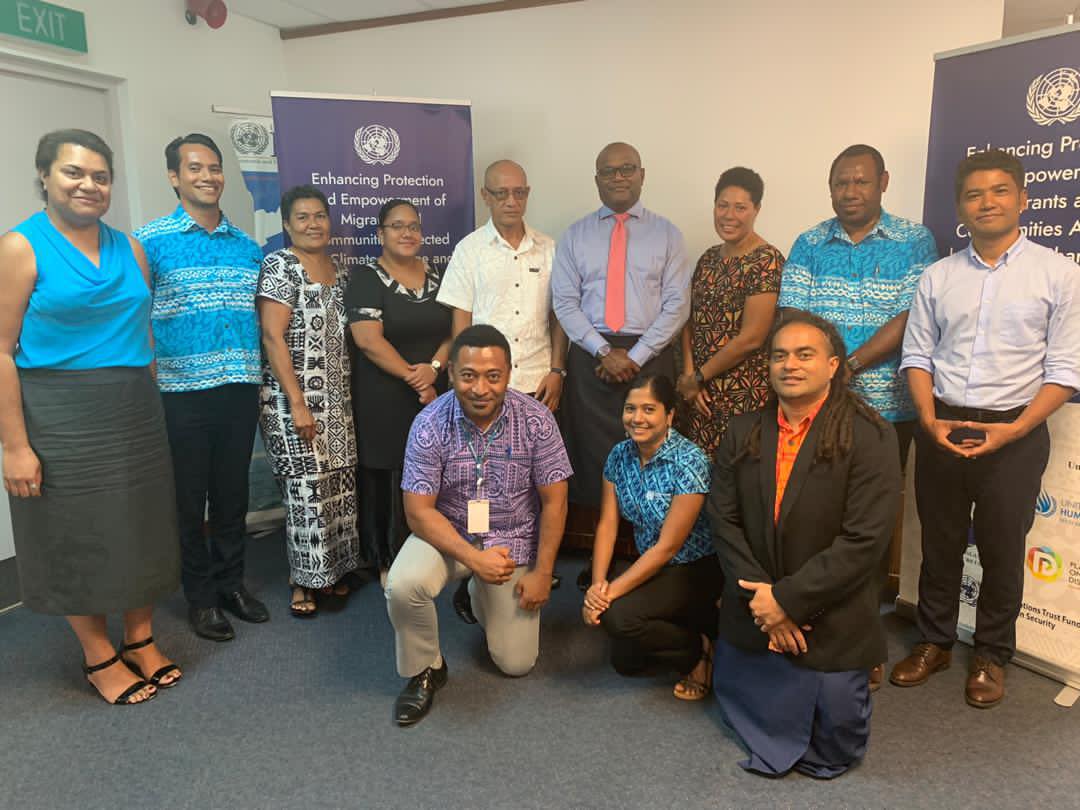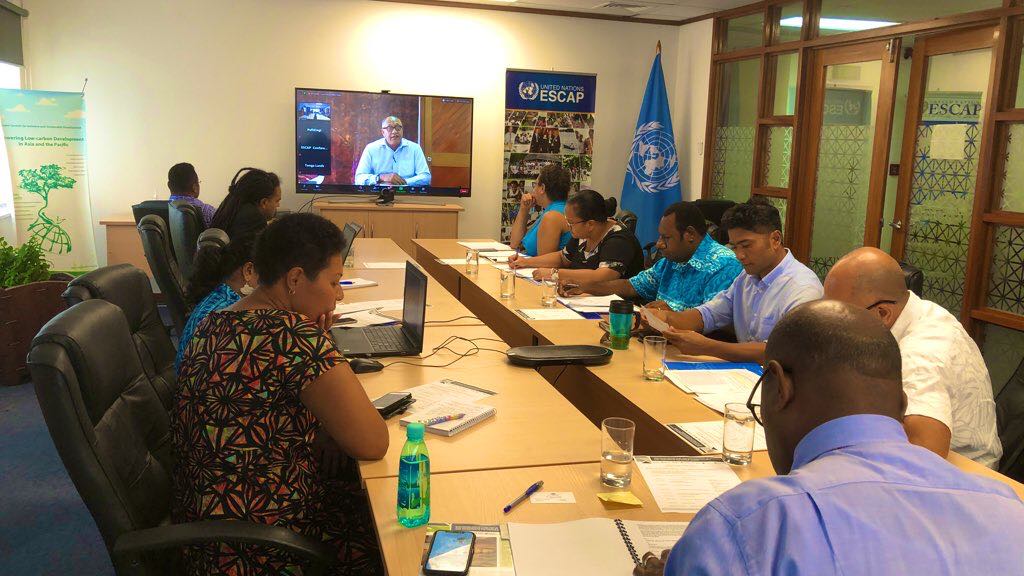 Pacific Regional Policy Dialogue on Climate Mobility
A rights-based response
Pacific Regional Policy Dialogue on Climate Mobility
A rights-based response

Challenges
Pacific communities are affected by a range of hazards. These hazards include both sudden-onset disasters, such as tropical storms, king tides and floods, and slow-onset disasters, such as droughts, sea-level rise, coastal erosion and ocean acidification. Disasters have had far-reaching impacts on human security in the Pacific Islands, especially in atoll countries, and are expected to increase in intensity even more due to climate change. Disasters often interact with the socio-economic conditions of the Small Island Developing States (SIDS) and shape migration patterns in the region.
Pacific communities are affected by a range of sudden-onset and slow-onset hazards that are either made more intense, accelerated by, or caused by climate change. This contributes to voluntary migration flows but at the same time, could increase displacement both internally and across borders. In order to adapt to the impacts of climate change, some governments are already supporting the movement of climate change-affected communities. The movement of people in the context of climate change and disasters presents unique human rights challenges.
Some of the challenges the Pacific islands face in this respect include insufficient coverage in national policy frameworks, capacity constraints, problems with land use and access, limited public financing, limitations of data and evidence, increasing needs of vulnerable populations, economic and social costs of migration, pressure on service and infrastructure provision and maintenance of culture and identity.
Several global policy frameworks on climate change, disaster risk reduction and migration make actionable recommendations for governments to pursue at national and regional levels. Similarly, core policy initiatives in the Pacific, such as the Framework for Resilient Development in the Pacific (FRDP) (2017-2030) and the Boe Declaration on Regional Security (2018), reiterate the need to protect individuals and communities most vulnerable to climate-related displacement through targeted national and regional policies, including regional labour migration schemes. Despite these achievements, there is an absence of agreed frameworks and arrangements between Pacific governments to address climate change-related migration, displacement and planned relocation.
Towards a Solution
Under the Pacific Climate Change Migration and Human Security programme, the United Nations Economic and Social Commission for Asia and the Pacific (ESCAP) facilitates discussions in the Pacific region around potential regional responses to climate change-related mobility (migration, displacement, planned relocation) that are based on human rights principles. The multi-stakeholder platform supports policy dialogue for senior officials from 12 SIDS in the Pacific to examine global, regional and national frameworks. Through the project, SIDS in the Pacific are able to learn from each other’s policies and experiences and to identify regional, national and sub-national policy measures on climate change-related mobility.
Such regional responses support governments to build community resilience to some of the impacts triggered or compounded by climate change (SDG 13; SAMOA Pathway priority ’climate change’) and to formulate or strengthen the implementation of planned and well-managed policies to facilitate orderly, safe, regular and responsible migration and mobility (SDG 10.7).
The 12 member and associate member states are: Cook Islands, Fiji, Kiribati, Palau, Papua New Guinea, Republic of the Marshall Islands, Federated States of Micronesia, Samoa, Solomon Islands, Tonga, Tuvalu and Vanuatu. Due to travel restrictions as a result the COVID-19 pandemic in 2020, the regional policy dialogue was conducted virtually through six two-hour webinars over a three-month period from September to November of that year. Participants included senior officials from government ministries (foreign affairs, climate change, lands, disaster management), academia, civil society organizations and development partners.
Participants of the regional policy dialogue reviewed and examined: (i) the challenges and opportunities to enhance protection of people migrating in relation to climate change; (ii) relevant global, regional and national initiatives; (iii) the human security implications of climate change and migration; (iv) options that the region could take to ensure the protection of climate-related migrants; and (v) existing regional agreements in the Pacific and how these agreements can be further strengthened and implemented.
Through the regional dialogue, opportunities were identified to close policy and legal gaps to protect the Pacific communities most prone to the impacts of climate change. South-South exchanges and learn- ing on the policies and measures adopted by individual Pacific countries to address challenges and harness opportunities of the climate change-related mobility are being compiled in the compendium. A regional framework will be developed by the Pacific countries and development community to promote recognition of and legal protection of migrants and displaced persons, particularly in the context of climate change. Commitments were made to conduct consultations at regional, national and sub-national levels so that this regional framework will be inclusive of all voices, respectful of national experiences and anchored in existing political processes.
The virtual format of the dialogue, while requiring significant support from ESCAP to sustain it over several months, proved to be an invaluable tool for South-South dialogue and engagement and allowed for broad and in-depth discussions of complex topics.
A targeted regional response—an ambitious goal that the programme is supporting—will establish the Pacific region as a forerunner in South-South cooperation in developing policy that focuses on the emerging issue of climate change-related mobility.
Contact Information
Countries involved
Supported by
Implementing Entities
Project Status
Project Period
URL of the practice
Primary SDG
Secondary SDGs
Similar Solutions
| NAME OF SOLUTION | Countries | SDG | Project Status | |
|---|---|---|---|---|
A-Card Initiative |
Fiji, Kiribati, Marshall Islands, Micronesia (Federated States of), Palau, Papua New Guinea, Samoa, Solomon Islands, Tonga, Tuvalu, Vanuatu | 10 - Reduced Inequalities | Completed | View Details |
Accelerating Digital Transformation in All Ministries in Bangladesh Promoting the rapid design and implementation of plans to digitize all ministries and subordinate government institutions in Bangladesh |
Fiji, Kiribati, Marshall Islands, Micronesia (Federated States of), Palau, Papua New Guinea, Samoa, Solomon Islands, Tonga, Tuvalu, Vanuatu | 10 - Reduced Inequalities | Ongoing | View Details |
Accessible Digital Textbooks Promoting inclusive education through Accessible Digital Textbooks |
Fiji, Kiribati, Marshall Islands, Micronesia (Federated States of), Palau, Papua New Guinea, Samoa, Solomon Islands, Tonga, Tuvalu, Vanuatu | 10 - Reduced Inequalities | Completed | View Details |
ADELANTE Triangular Cooperation European Union – Latin America and the Caribbean |
Fiji, Kiribati, Marshall Islands, Micronesia (Federated States of), Palau, Papua New Guinea, Samoa, Solomon Islands, Tonga, Tuvalu, Vanuatu | 10 - Reduced Inequalities | Ongoing | View Details |
A Farm-to-Table Value Chain Approach Creating employment for youth in organic farming in Fiji and Vanuatu |
Fiji, Kiribati, Marshall Islands, Micronesia (Federated States of), Palau, Papua New Guinea, Samoa, Solomon Islands, Tonga, Tuvalu, Vanuatu | 02 - Zero Hunger | Completed | View Details |

